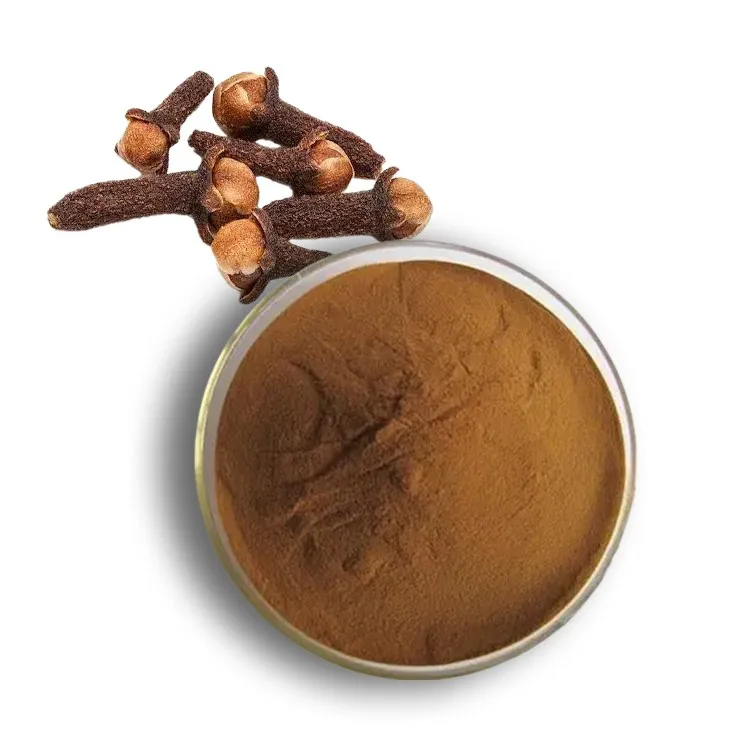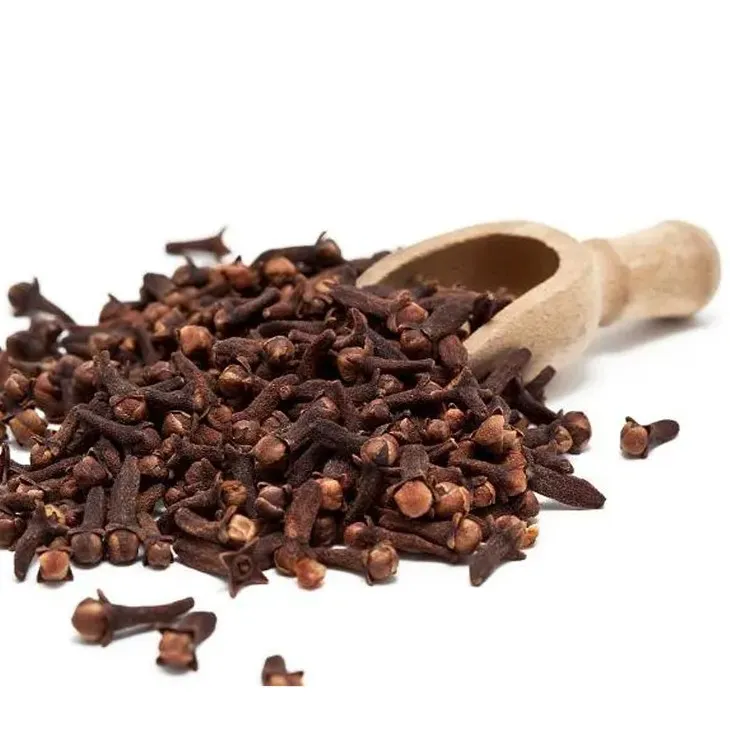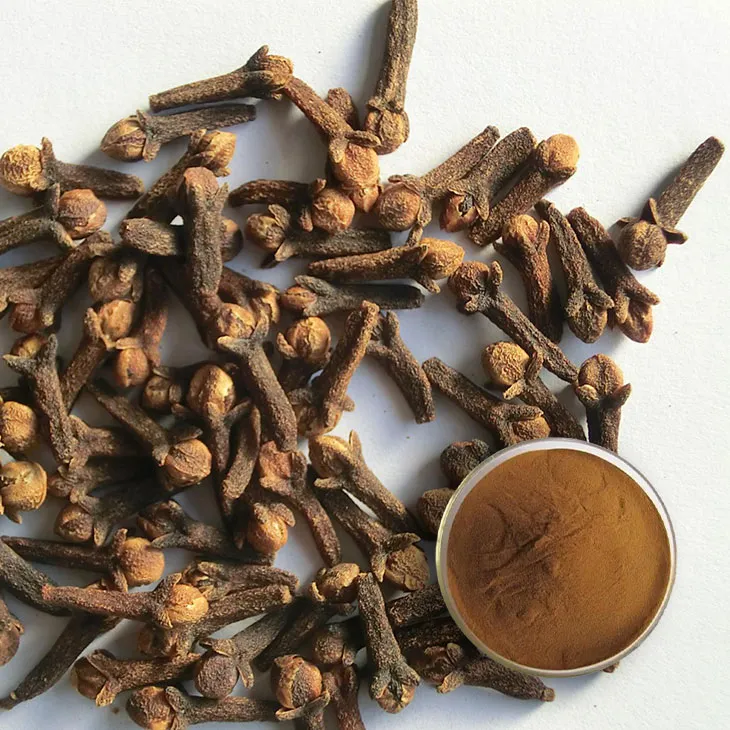- 0086-571-85302990
- sales@greenskybio.com
Clove powder can reduce high blood pressure.
2024-11-12

Introduction
Hypertension, or high blood pressure, is a common and serious medical condition that affects a large proportion of the global population. It is a major risk factor for cardiovascular diseases such as heart attacks, strokes, and heart failure. Traditional treatment methods for hypertension mainly include lifestyle modifications and the use of antihypertensive drugs. However, in recent years, there has been an increasing interest in exploring the potential of natural products, such as Clove Powder, in reducing blood pressure.

Components of Clove Powder
Clove Powder is derived from cloves, which are the dried flower buds of the Syzygium aromaticum tree. It contains a variety of bioactive components that may contribute to its potential blood - pressure - reducing effects.
Eugenol
Eugenol is one of the main components in clove powder. It has been widely studied for its antioxidant and anti - inflammatory properties.
- Antioxidant Activity: Oxidative stress is closely related to hypertension. Reactive oxygen species (ROS) can damage vascular endothelial cells and lead to endothelial dysfunction, which is an early event in the development of hypertension. Eugenol can scavenge ROS, reducing oxidative stress in the body. This helps to protect the vascular endothelium and maintain its normal function.
- Anti - inflammatory Effect: Chronic inflammation also plays a role in the pathogenesis of hypertension. Eugenol can inhibit the production of inflammatory mediators such as cytokines and chemokines. By reducing inflammation in the blood vessels and surrounding tissues, it can improve vascular health and potentially lower blood pressure.
Potassium and Magnesium
Potassium and magnesium are two important minerals present in clove powder.
- Potassium: A diet rich in potassium is associated with lower blood pressure. Potassium helps to balance the effects of sodium in the body. High sodium intake can cause fluid retention and increase blood pressure, while potassium promotes the excretion of sodium through the kidneys. By increasing potassium intake, such as through consuming clove powder, it may help to regulate sodium - potassium balance and reduce blood pressure.
- Magnesium: Magnesium is involved in many physiological processes in the body, including vascular smooth muscle relaxation. Deficiency in magnesium has been linked to hypertension. Clove powder, with its magnesium content, may contribute to maintaining normal blood pressure by promoting the relaxation of blood vessels.

Mechanisms of Action on Blood Pressure
Clove powder may reduce blood pressure through multiple mechanisms.
Improving Vascular Endothelial Function
The vascular endothelium plays a crucial role in regulating blood pressure. A healthy endothelium releases various substances that help to maintain blood vessel dilation and normal blood flow.
- As mentioned earlier, eugenol in clove powder can protect the vascular endothelium from oxidative stress and inflammation. This allows the endothelium to function properly and release substances such as nitric oxide (NO). NO is a powerful vasodilator, which means it can relax the smooth muscles in the blood vessel walls, causing the blood vessels to widen and blood pressure to decrease.
- The minerals in clove powder, such as potassium and magnesium, also contribute to endothelial function. Potassium helps to maintain the electrical potential across the cell membranes of endothelial cells, while magnesium is involved in the regulation of endothelial cell signaling pathways. These effects together help to keep the vascular endothelium in a healthy state and promote normal blood pressure regulation.
Affecting the Renin - Angiotensin - Aldosterone System (RAAS)
The RAAS is an important hormonal system involved in blood pressure regulation.
- When blood pressure drops or there is a decrease in blood volume, the kidneys release an enzyme called renin. Renin then converts angiotensinogen to angiotensin I, which is further converted to angiotensin II by the angiotensin - converting enzyme (ACE). Angiotensin II is a potent vasoconstrictor and also stimulates the release of aldosterone from the adrenal glands. Aldosterone promotes sodium and water retention in the kidneys, increasing blood volume and blood pressure.
- Clove powder may interfere with the RAAS. Eugenol has been shown to have ACE - inhibitory activity in some studies. By inhibiting ACE, it can reduce the production of angiotensin II, thereby preventing excessive vasoconstriction and sodium - water retention. This can lead to a decrease in blood pressure.

Using Clove Powder as a Dietary Supplement
Clove powder can be used as a dietary supplement for blood pressure management, but there are several important considerations.
Dosage
- Determining the appropriate dosage of clove powder is crucial. Too little may not produce the desired blood - pressure - reducing effect, while excessive use may lead to potential adverse effects.
- The optimal dosage may vary depending on factors such as an individual's age, gender, overall health status, and the severity of hypertension. It is recommended to start with a low dose and gradually increase it under the guidance of a healthcare professional.
Individual Differences
- Different people may respond differently to clove powder. Some individuals may experience significant blood pressure reduction, while others may have a more limited response.
- Genetic factors, underlying health conditions, and concurrent medications can all influence how a person responds to clove powder. For example, people with certain genetic polymorphisms may have altered metabolism of the components in clove powder, affecting its efficacy. Also, those taking other medications for hypertension or other conditions need to be cautious as there may be potential interactions between clove powder and these medications.
Combination with Traditional Antihypertensive Drugs
Clove powder may also be used as an adjunct to traditional antihypertensive drugs.
Synergistic Effects
- In some cases, combining clove powder with traditional antihypertensive drugs may produce synergistic effects. For example, if a person is taking an ACE inhibitor drug, the ACE - inhibitory activity of eugenol in clove powder may enhance the overall blood - pressure - lowering effect.
- The combined use may also help to address different aspects of hypertension. While drugs may directly target the RAAS or other mechanisms, clove powder can contribute to improving vascular endothelial function through its antioxidant and anti - inflammatory properties.
Precautions
- However, when using clove powder in combination with antihypertensive drugs, it is essential to be cautious. There is a risk of drug - supplement interactions that could lead to unwanted side effects or changes in the effectiveness of the drugs.
- Healthcare providers should be informed if a patient intends to use clove powder in addition to their prescribed medications. They can then monitor the patient's blood pressure and overall health more closely to ensure safety and efficacy.
Conclusion
Clove powder shows potential in reducing high blood pressure through its various components and mechanisms of action. Its main component eugenol, along with potassium and magnesium, can improve vascular endothelial function and affect the RAAS. While it can be used as a dietary supplement or in combination with traditional antihypertensive drugs, careful consideration of dosage and individual differences is necessary. Further research is still needed to fully understand its long - term safety and effectiveness in hypertension management, but it represents an interesting area of exploration in the search for natural alternatives or adjuncts to traditional blood - pressure - lowering therapies.
FAQ:
1. How does clove powder reduce high blood pressure?
Clove powder may reduce high blood pressure mainly through its main component eugenol. Eugenol has antioxidant and anti - inflammatory properties, which can improve vascular endothelial function and affect the renin - angiotensin - aldosterone system. Also, elements like potassium and magnesium in clove powder contribute to blood pressure regulation.
2. Can clove powder be used alone to treat high blood pressure?
Clove powder may not be used alone as a sole treatment for high blood pressure. While it may have properties that can contribute to blood pressure reduction, high blood pressure is a complex condition. It can be used as a dietary supplement or an adjunct to traditional antihypertensive drugs.
3. Are there any side effects when using clove powder for high blood pressure?
There may be potential side effects when using clove powder. Excessive intake may cause digestive problems such as nausea, vomiting, or diarrhea. Also, individual sensitivities vary, so some people may experience allergic reactions. Dosage control is crucial to avoid potential adverse effects.
4. How much clove powder should be taken for high blood pressure?
The appropriate dosage of clove powder for high blood pressure has not been precisely defined. It varies depending on individual factors such as age, overall health, and the severity of hypertension. It is always advisable to consult a healthcare professional before starting any supplementation.
5. Is clove powder more effective for certain types of high blood pressure?
There is currently no evidence to suggest that clove powder is more effective for certain types of high blood pressure. However, its general mechanisms of action on improving vascular function and influencing hormonal systems may potentially benefit different types of hypertension, but more research is needed.
Related literature
- The Potential of Clove (Syzygium aromaticum) in Cardiovascular Health"
- "Eugenol and Blood Pressure Regulation: Insights from Recent Studies"
- "Nutritional Components in Clove Powder and Their Impact on Hypertension"
- ▶ Hesperidin
- ▶ citrus bioflavonoids
- ▶ plant extract
- ▶ lycopene
- ▶ Diosmin
- ▶ Grape seed extract
- ▶ Sea buckthorn Juice Powder
- ▶ Beetroot powder
- ▶ Hops Extract
- ▶ Artichoke Extract
- ▶ Reishi mushroom extract
- ▶ Astaxanthin
- ▶ Green Tea Extract
- ▶ Curcumin Extract
- ▶ Horse Chestnut Extract
- ▶ Other Problems
- ▶ Boswellia Serrata Extract
- ▶ Resveratrol Extract
- ▶ Marigold Extract
- ▶ Grape Leaf Extract
- ▶ blog3
-
High purity olive leaf extract
2024-11-12
-
Lavender oil extraction method
2024-11-12
-
100% organic virgin sea buckthorn fruit oil
2024-11-12
-
Lotus leaf extract powder factory in China
2024-11-12
-
China aged garlic extract supplier
2024-11-12
-
Deer antler extract powder manufacturer
2024-11-12
-
Saw palmetto extract vs whole herb
2024-11-12
-
Nettle Root Extract
2024-11-12
-
Lemon Extract
2024-11-12
-
Black Rice Extract
2024-11-12
-
Cat Claw Extract
2024-11-12
-
Acai Berry Extract
2024-11-12
-
Tormentil Extract
2024-11-12
-
Polygonum Cuspidatum Extract
2024-11-12
-
Senna Leaf Extract
2024-11-12
-
Withania Somnifera Extract
2024-11-12
-
Hops Extract
2024-11-12





















